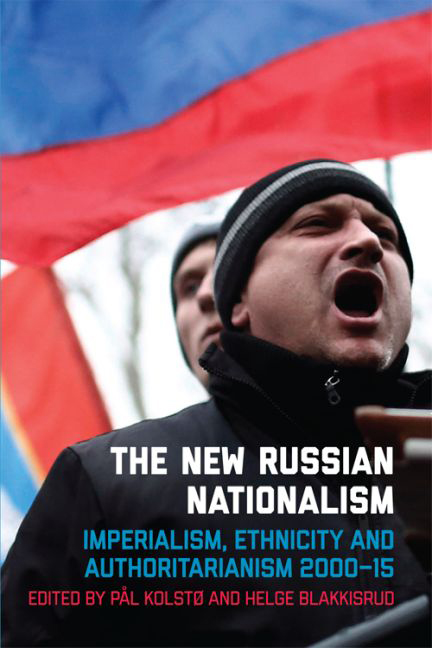Book contents
- Frontmatter
- Contents
- List of Figures
- List of Tables
- Acknowledgements
- Notes on Contributors
- Introduction: Russian nationalism is back – but precisely what does that mean?
- 1 The ethnification of Russian nationalism
- 2 The imperial syndrome and its influence on Russian nationalism
- 3 Radical nationalists from the start of Medvedev's presidency to the war in Donbas: True till death?
- 4 Russian ethnic nationalism and religion today
- 5 Everyday nationalism in Russia in European context: Moscow residents’ perceptions of ethnic minority migrants and migration
- 6 Backing the USSR 2.0: Russia's ethnic minorities and expansionist ethnic Russian nationalism
- 7 Rallying ’round the leader more than the flag: Changes in Russian nationalist public opinion 2013–14
- 8 How nationalism and machine politics mix in Russia
- 9 Blurring the boundary between civic and ethnic: The Kremlin's new approach to national identity under Putin's third term
- 10 Russia as an anti-liberal European civilisation
- 11 Ethnicity and nationhood on Russian state-aligned television: Contextualising geopolitical crisis
- 12 The place of economics in Russian national identity debates
- Bibliography
- Index
4 - Russian ethnic nationalism and religion today
- Frontmatter
- Contents
- List of Figures
- List of Tables
- Acknowledgements
- Notes on Contributors
- Introduction: Russian nationalism is back – but precisely what does that mean?
- 1 The ethnification of Russian nationalism
- 2 The imperial syndrome and its influence on Russian nationalism
- 3 Radical nationalists from the start of Medvedev's presidency to the war in Donbas: True till death?
- 4 Russian ethnic nationalism and religion today
- 5 Everyday nationalism in Russia in European context: Moscow residents’ perceptions of ethnic minority migrants and migration
- 6 Backing the USSR 2.0: Russia's ethnic minorities and expansionist ethnic Russian nationalism
- 7 Rallying ’round the leader more than the flag: Changes in Russian nationalist public opinion 2013–14
- 8 How nationalism and machine politics mix in Russia
- 9 Blurring the boundary between civic and ethnic: The Kremlin's new approach to national identity under Putin's third term
- 10 Russia as an anti-liberal European civilisation
- 11 Ethnicity and nationhood on Russian state-aligned television: Contextualising geopolitical crisis
- 12 The place of economics in Russian national identity debates
- Bibliography
- Index
Summary
This chapter examines the ideology and the political practice of Russian ethnic nationalists, exploring religio-ideological trends in contemporary Russian ethnic nationalism and assessing their potential. By Russian ethnic nationalists, I refer solely to those individual authors, parties and movements who hold the self-determination of Russians as an ethnic group as a central element of their ideology and political programme. Thus I do not deal here with political movements that are not nationalist but that borrow from the nationalists various popular ideas or political slogans at odds with the basic ideology of that party or movement.
Ethnic nationalists do not acknowledge that it is possible or necessary to create a civic nation that unites different ethnic and racial groups within Russia. For them, the Russian Federation is an alien state, dominated by a minority that oppresses the majority – akin to the South African system of apartheid. Nationalists often call Russia ‘Rossiianiia’ or ‘Erefiia’ (‘RF-iia’), stressing that they are not patriots. For nationalists, the word ‘rossiianin’, a citizen of the Russian Federation, as opposed to ‘russkii’, an ethnic Russian, is an insult, and ‘tozherossiianin’ (‘also-a- Russian- citizen’) is a scornful label for non-Russian ethnic groups.
Russian ethnic nationalism and religion in historical Perspective
Ethnic nationalism is a relatively young ideology in Russia. Political thought in Russia has always focused on the relationship between the state and Orthodox Christianity. Until the beginning of the nineteenth century, the historical role of the Russian people was rarely questioned. As John Anderson notes, in the first quarter of the nineteenth century, Slavophiles were the first to focus more on the roots of religion in the ‘national psyche’ (2012: 209). Slavophiles barely distinguished the ‘people’ from the ‘state’: ‘they all took the view that Orthodoxy was in some sense core to the very identity of Russians as a people and Russia as a state’ (ibid.). At that time the Russian people were divided into social classes with differing legal status, so the foundations for ethnic nationalism had not yet been laid. The idea of a civic nation, borrowed from the West, was unacceptable to conservatives, but was to become the hallmark of the liberal and social-democratic camp.
- Type
- Chapter
- Information
- The New Russian NationalismImperialism, Ethnicity and Authoritarianism 2000–2015, pp. 104 - 131Publisher: Edinburgh University PressPrint publication year: 2016

